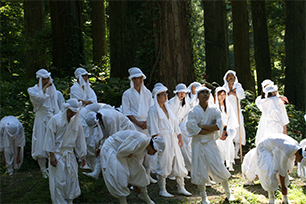Yuri Fuwa, Director, Keio Research Center for Liberal Arts
Ten Years of the Keio Research Center for Liberal Arts: Dancing Passionately for Education?

Students take a break during a walking trip to experience being a mountain priest at Mt. Haguro
In the evening at the Raiosha building on Hiyoshi Campus, students turn up to dance hip-hop. Dancing became a compulsory subject in junior high schools in April 2012, but on Hiyoshi Campus, there are already faculty members who dance (perhaps even though they might not be particularly good at sports). Keio’s founder, Yukichi Fukuzawa, emphasized the importance of becoming physically strong before developing one's mind. At the Keio Research Center for Liberal Arts, we focus on an education method in which the body’s senses are stimulated through various experiences in order to acquire true understanding as well as language skills. Through the “Program for Promoting High-Quality University Education”, approved by the Ministry of Education, Culture, Sports, Science and Technology (MEXT), we have learned that students acquire profound language skills when they read literature aloud, play music, move their bodies as they read, and when they are assigned to write a literary piece or produce a piece through expressive arts such as dancing, video, drawings, and paintings. We aim at developing participatory classes that take a different approach from lectures.
The Research Center for Liberal Arts has nurtured techniques to gain knowledge through its “Academic Skills” course, a Kyokuto Securities Company-endowed-course. Students who have just graduated from high school are not confident that their interests will be accepted as a theme for an academic paper. Students may feel down when they receive tough feedback from their fellow classmates and teachers, but by picking themselves up again and again, taking the feedback on board each time, and finally completing a paper, students gain confidence that their ideas are at or above university standards. They are always fighting in a battle to learn. This year, we will hold an essay contest in which first-year and second-year students from all the faculties will have the opportunity to compete in this one-round battle of wits. Through such initiatives, we are able to teach techniques for gaining knowledge even to those students who do not participate in our center-sponsored classes.
The center’s activities do not stop there. Students who complete the “Academic Skills” course then become advisors who instruct other students on how to write reports and find references. These student-turned-advisors can continue to learn by teaching others. This peer mentoring system is still very rare in our country and is truly an approach that embodies the spirit of hangaku hankyo, “learning while teaching, teaching while learning”, a tradition dating back to the early days of Keio's history, by which students taught each other depending on their strengths.
Because this research center is rather young—still only in its 10th year since establishment—it is supported by the passion of faculty and staff members and the students who are inspired by that passion. We will continue to research pedagogical methods which benefit students and produce graduates who look back and feel thankful for having taken such classes. We ask for your further understanding and support.
*Position titles, etc., are those at the time of publishing.
